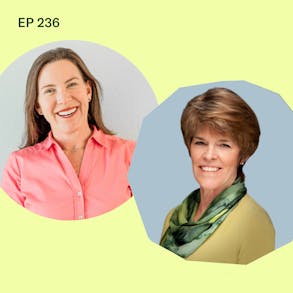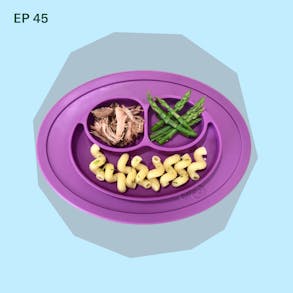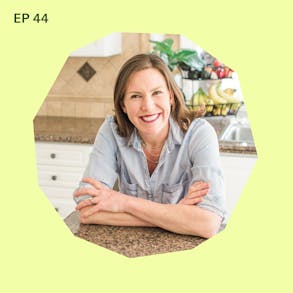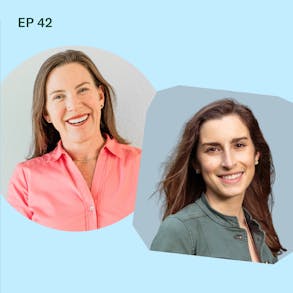Positive Tilt: Get Permission from Your Baby with Marsha Dunn Klein, OTR/L, M.Ed., FAOTA
- Her “positive tilt” construct and how this indicates permission given by babies who agree to eat what is being offered to them at the table.
- The importance of understanding the way a baby communicates to avoid confusing their responses as behavior problems.
- Tips for parents on how to avoid frustrating mealtimes and help their babies grow up to be enthusiastic eaters

LISTEN TO THIS EPISODE
Episode Description
Having our babies reject food at mealtimes almost always turns into a stressful situation. The question is, should you offer your baby food and patiently wait for acceptance or demand that they eat it? To answer this question, I am joined by Marsha Dunn Klein, OTR/L, M.Ed., FAOTA, a pediatric occupational therapist who has spent over fifty years specializing in children with feeding challenges.
In this episode, Marsha discusses with us her “positive tilt” construct which is a sign of sensory permission or a way babies communicate to their parents when they are finally ready to lean towards food, open their mouths to eat and create a connection or a “yes moment” within their feeding environment.
About the Guest
- Marsha Dunn Klein OTR/L,MEd, FAOTA is a pediatric occupational therapist who has spent a career specializing in pediatric feeding challenges.
- She received her bachelor's degree in occupational therapy from Sargent College of Boston University in 1971. She also received a master’s degree in education with emphasis on special education in 1975 from the University of Arizona.
- Marsha has co-authored PreFeeding Skills editions one and two and Mealtime Participation Guide and Homemade Blended Formula Handbook with Suzanne Evans Morris and Feeding and Nutrition for the Child with Special Needs with Tracy Delaney.
- Her book Anxious Eaters, Anxious Mealtimes: Practical and Compassionate Strategies for Mealtime Peace serves as a great resource for parents and caregivers.

Links from This Episode
Check-out Marsha Dunn Klein’s courses:
- Dear Parent: Navigating Challenging Mealtimes with Anxious Eaters (FREE course)
- The Get Permission Approach to Anxious Eaters, Anxious Mealtimes Master Course (Master course)
Check-out her books:
- Pre-Feeding Skills: A comprehensive resource for mealtime development
- Visit the Get Permission Institute
- Learn more about Get Permission Approach
- Read Tube Feeding with Love
- Baby-Led Weaning with Katie Ferraro program with the 100 First Foods™ Daily Meal Plan, join here: https://babyledweaning.co/program
- Baby-Led Weaning for Beginners free online workshop with 100 First Foods™ list to all attendees, register here: https://babyledweaning.co/baby-led-weaning-for-beginners
Other Episodes Related to this Topic

Latest Episodes






Marsha Dunn Klein (1m 2s):
The positive tilt in my mind is a construct. It's a feeling and it's something you can feel it and see it. The positive tilt is a coming together at the food. It's a connection. It's a yes moment.
Katie Ferraro (1m 17s):
Hey there, I'm Katie Ferraro, registered dietician, college nutrition professor, and mom of seven specializing in baby-led weaning here on the Baby-Led Weaning Podcast. I help you strip out all of the noise and nonsense about feeding, leaving you with the competence and knowledge you need to give your baby a safe start to solid foods using baby led weaning. He's your baby giving you permission to offer new foods or are there cues telling you maybe I'm not ready yet? Today's guest is Marsha Dunn Klein, a frequent visitor to the baby led weaning. It made easy podcast and Marsha is going to be teaching us about her construct known as the positive tilt.
Katie Ferraro (2m 2s):
So the positive tilt is a component of Marsha's get permission approach to offering new foods to babies. Marsha Dunn Klein is a pediatric occupational therapist. She's specialized in working with children who have feeding challenges and she's done so for over 50 years, she actually co-authored the first book on pediatric feeding or pre feeding skills. And her latest book is Anxious Eaters, Anxious Mealtimes, Practical and Compassionate Strategies for Mealtime Peace. So she's the get permission lady, she's the anxious eater lady, she's the meal time peace lady and she put it all together in 2021. Marsha and her colleagues started the Get Permission Institute, an online education platform, providing feeding courses for professionals.
Katie Ferraro (2m 42s):
And she also has some parents' stuff now, but it's based on the principles of the get permission approach. So this idea of the positive tilt is among one of the many constructs that she's developed and has promoted. And I just want to say for the other feeding professionals who are listening, it is so important that we are giving credit where credit is due. And I can say personally, as someone who sees a lot of my own techniques and frameworks being copied without attribution, it not only just boils my blood, but it makes me so invested in making sure that we, as feeding professionals are aware of the body of work that comes from the practitioners who came before us. And those who also continue to work alongside us like Marsha Dunn Klein. So this is also a bit of a history lesson about some of the approaches that Marsha uses in her get permission Institute, which has shaped a lot of the way that many of you perhaps is feeding therapists are currently utilizing in your practice and the get permission Institute, which if you are a feeding professional is a wonderful online location with a lot of courses and trainings.
Katie Ferraro (3m 41s):
There's also info there for parents and caregivers and health care professionals. So Marsha is always so gracious with her time and sharing her expertise and you can sharing her experiences and also her own constructs and the different theories that she's developed. If you're wondering if you've heard her before, she's been on the podcast back in episode 2 0 6, we did a very popular episode called Stay in Your Lane, Parent and Baby Roles in Infant Feeding with Marcia, Dunn Klein. And she was also in episode 170. That episode was called Sensory 1 0 1. What Motivates Babies to Eat with Marsha Dunn Klein. So today Marsha's back talking about the positive tilt, how to get permission from your baby with no further ado.
Katie Ferraro (4m 22s):
Here's Marsha Dunn Klein.
Marsha Dunn Klein (4m 27s):
Hi Katie. How are you?
Katie Ferraro (4m 29s):
I am good at is always so wonderful to hear. I can hear your smile in your voice. Now I've already done a very glowing backgrounder in the intro on the importance of your work, the work you do currently, the work you have done over the decades, but could you give us an update? I'm just curious. What are you working on these days? What's exciting you in feeding today?
Marsha Dunn Klein (4m 48s):
Oh my goodness. Such a big question. So I'm being pretty active in the get permission Institute, which I co-founded, and we're putting lots of courses online, new things every month. What we're trying to teach about infant feeding, picky eaters, relationship-based feeding and not only are they get permission staff presenting, but also we're inviting perspectives courses, colleagues that have sort of similar ways of thinking. Complimentary ways of thinking. As we really try to all expand our information about feeding. Another thing I do have to tell you about is, you know, that I invented the teether hearts. It's a mouthing toy that is the shape of a heart.
Katie Ferraro (5m 27s):
I love them. You sent me like a million and I give them to every single baby. I encounter multiple ones. They love them.
Marsha Dunn Klein (5m 32s):
Yes. So first of all, we were sending them everywhere because I just want them in people's hands. But the thing that's exciting, Katie is that we're working with the company and working with hospitals to get grants, to buy them in bulk, to just give them out to babies. And the thing I like about that is that we're sending babies home from hospitals and clinics with a heart shaped mouther to remind babies and families about the connection and the relationship and the love that we want to immerse in the feeding relationships. So it's pretty exciting.
Katie Ferraro (6m 1s):
And I love those teether hearts. They come in a package of...they're two to a package or three to a package Marsha? I can't remember.. Three to a package and lots of different colors. So every time a new baby comes to my house and we're doing baby led weaning. I always send them home with them. And I have to say that as a new mom, when I had no experience in feeding, I just thought it was a toy. I didn't realize that teethers were developmental and how they can be tied to helping to meet feeding milestones and then later speech. And then you put the beautiful tea, their hearts together with the heart, which is, I just think so representative of the kind and loving work that you do. I know you have a discount code for those it's MARSHA20, is that correct?
Marsha Dunn Klein (6m 39s):
Yes. And it's with special supplies and maybe you can put that at.
Katie Ferraro (6m 42s):
I will. And I put the link to the teether heart with a bunch of pictures. They can see them in action. I always try to tag you in Instagram when the babies are knowing on them, chewing on them, we had a baby the other day, he was brand new six months in two weeks, just sitting up. We were trying mango had some pureed mangoes, some strips of mango. She wasn't feeling anything. She took her shoe off and she started eating her shoe Marsha. And I was like, oh gosh, you know, you can't put this on social media. I'm gonna be like, and that dietitian Katie let's babies, either shoe. So we were just talking with the mom and laughing. She said, you know, the only thing she wants in her mouth is her shoe right now. So we'll dip the shoe in the mango puree and see what she does grab the shoe, started licking her own shoe. This is all behind the scenes stuff, but I gave him the teether heart. Cause I know you always recommend, well, listen, if they're not interested in eating another ways, you might try dipping the puree for different flavors in it.
Katie Ferraro (7m 23s):
And she took the teether heart and she started eating it off of the teether, which was probably more appropriate than eating it off of her own shoe.
Marsha Dunn Klein (7m 30s):
I love it. I love it. And you know, just as a, a plug from mouthing toys of all kinds is that they give kiddos the opportunity to just learn about their mouth and learn about the front and the back of the mouth. And their tongue learns about the side of their mouth. They learn about textures. And so I love mouthing toys as kind of a pre you tense for some kiddos because they dip the teeth that are hard or the melding toy in, in a food that's nearby or in their parents' plate. And they can find flavors that they love.
Katie Ferraro (7m 59s):
So Marsha, you developed the get permission approach, which is, and this is a quote in your words, a responsive, sensitive, and supportive approach to feeding. And I wanted to ask for some background, like, what was your impetus in formalizing this approach for other feeding professionals? And when you decided to formalize your approach, I'm just curious, what was the environment in pediatric feeding at the time? Like what was happening in your world in the area of feeding therapy and teaching before? Cause I assume it was about not getting permission. If you felt the need to go and create the get permission approach.
Marsha Dunn Klein (8m 29s):
That's so interesting, you know, because I've been doing this for over 50 years, Katie I've been around some of this history, right? And when Suzanne Evans Morrison, I created the pre-feeding skills book in 1986, we really did pay attention to permission relationships, reading cues, supporting parent and baby bonding and attachment with feeding. And that was central to our world. And we learned some people from before us Ainsworth and Bell, we learned from Shawtore people that were studying attachment and relationships. And then, so we shared our approach. And what I began to realize is that there were a lot of people that were inspired by what we were talking about because it was the first feeding book that was out there.
Marsha Dunn Klein (9m 9s):
But also there were a lot of people out there that had a much more behavioral, strict approach, where they were focusing on the adults, getting food in kids. And I was hearing too many parents tell me about their kids coming to feeding therapy, crying, and sobbing or crying when they got to the parking lot or crying when they were being forced to eat a new food that we're worried about. And, and to know me is to know that that's just not my style, that that just breaks my heart. And so I started really focusing on, is the baby ready at teaching therapists? And teaching parents, is the baby ready for that food? Are they interested in it?
Marsha Dunn Klein (9m 50s):
How do we read baby's cues? Not how do we get this food in them because we're bigger. And that really seemed to shift how people who took my classes and stuff, how they thought about feeding. And I have to tell you, Katie, we're still working on this today.
Katie Ferraro (10m 4s):
It's job security, Marsha. That's kind of how I feel as well. It's like if everyone had it figured out, we would all be out of a job. So thank you for the work you have done and are continuing to do. And I know personally, as someone who creates original programs and frameworks and techniques for helping prepare and offer food safely for babies, I'm a huge stickler for giving credit where credit is due. So if we're talking about feeding babies, the concept known as the positive tilt is, and always should be attributed to you, Marsha Dunn Klein. So can you explain your concept of the positive tilt in infant feeding? And if you don't mind, give us some history of the idea and how it came to be.
Marsha Dunn Klein (10m 39s):
Well, thank you. So the positive tilt in my mind is a construct. It's a feeling and it's something you can feel it and see it. So when a parent offers food, that's one of the tenants of the get permission approach is the parents, the adults offer and the child can come forward to say, yes, I want that food. I want that breast. I want that spoon. I want that cup. I want it. And they come together at the food. The baby can either reach for the food, open their mouth to say they want it. They can lean in the positive tilt is a coming together at the food. It's a connection. It's a yes moment.
Marsha Dunn Klein (11m 20s):
But we see a lot of children when the food is offered, especially when the adults are thinking it's their job to get food in. Right? But when a food is offered, if we see a lot of babies who are already worried about food, want to get out of the Heights, you want to get away, want to push it away. That negative tilt that pulling away is the opposite of the positive tilt. So when baby led weaning, Katie, you do the best job of saying, you know, babies, you know, we want to wait until they're sitting in a high chair that they have some postural strength. They have some support in their chair and their hands are available to with foods. And you're saying those wonderful things, because we want babies to be able to be in charge of their pace and learning about foods.
Marsha Dunn Klein (12m 3s):
And I watch your Instagram all the time and you have all kinds of babies. And some of them are thrilled to death. They have a positive tilt. They lean into the food, they want it, their eyes get wide. They're grabbing things to put in their mouth immediately. And then, you know, all those other babies, there's a whole group of cautious babies that kind of lean back and check it out from a distance and kind of poke it around a little bit to start with every baby is different.
Katie Ferraro (12m 27s):
And I always share, I always, I try to share it. I know you appreciate it. Cause I know, I see you sending me hearts that I say sometimes I'm sorry, this is tortures to watch in stories for some parents. Like this is really maybe really boring. And almost every single time you do that, you get so many messages. This is not boring. I needed to see this. My baby didn't immediately take to food. They don't look like all the other babies on social media. So I'm very intentional about sharing the lots of dead space. Cause there's a lot of downtime where you think nothing's happening, but the baby's actually learning. So thank you for recognizing that.
Marsha Dunn Klein (12m 54s):
Well, Katie, you do that so well. And the thing is we get to offer and you get to offer a lot of different kinds of foods and textures. And I love that you're giving parents confidence in that area, but also you pause, we get to offer. But that doesn't mean immediately. They're not putting something in their mouth that we are going to just shove it in their mouth. Some babies need what we call. We call these rehearsals just to be around it, to touch it and feel it and smell it and pick it up and put it down. And I watched a baby the other day, pick up a banana for the first time, pick it up, put it down, pick it up, put it down, put it to their lips, took it away in their mouth, spit it out in the mouth, spit it out four or five times. And then maybe the sixth or seventh time they had the piece in their mouth.
Marsha Dunn Klein (13m 38s):
They thought, oh, well I could chew this up and I could eat it. But it has to be at the child's pace. And that's the idea of get permission. Katie is that we get to offer, but we're not requiring every baby to be alike. We are offering. And then it is our privilege as adults to watch how the baby's reacting to that food and see, how can we help them? You know, what foods can we help them feel comfortable with and what opportunities can we give them? So they can go forward in food exploration at their own pace.
Katie Ferraro (14m 9s):
And I've learned so much review Marsha like, I'm a big talker. I'm a conversationalist. I, we get on a podcast episode, it takes me Marsha 30 minutes to actually start recording. She's like, should we start? Was like, oh, sorry, but to not talk to be at peace to don't touch the baby of, we were just doing an episode all on the best advice that parents have to give other parents. Like if you could talk to your self three months ago, when you were starting baby led weaning, what advice would you give? And the first email we got back was said, there was some psychologist lady. They were talking about you on the podcast, talking about staying in your own lane and doing your job and don't touch the baby and micromanage things. I needed to hear that. And I always say, gosh, I need to hear that. And be reminded of that. Sometimes it's just quiet. It's dead space.
Katie Ferraro (14m 48s):
Sometimes let the baby pick up and drop the food 50 times and be wiping them with a wet wipe and reposition him, putting the spoon back in their hand. Like they need lots of time to practice. So thank you for reminding us of that. And I, I corrected her with your appropriate credentials and then center that episode again. But these messages are important for parents to hear because we live in this era where you just think, gosh, as a parent, I should automatically know how to do this thing. I've never done before. Like, of course not, you don't know what's going on and neither does your baby. We all need space and time to learn. And I love your get permission approach because it's slowed down. We're not in a, this is not a race here, you know?
Marsha Dunn Klein (15m 21s):
And you know, sometimes when you offer foods, the baby may not put it anywhere near their mouth. The first day or two you offer it. They're just having the opportunity to be around it. But as they have that opportunity in repeated ways, in lots of different non pushy situations, and as they feel safe and comfortable, you know, most babies are going to move forward at their own pace and just learn how to heat. And some babies are stuck for other reasons, but just because they're a little slower at the uptake, doesn't mean we have to get in their face and do it to them. So reading cues, I think is the most important thing we can teach parents.
Katie Ferraro (15m 55s):
And so this construct of the positive tilt, which we attribute to you, you kind of touched on it previously, but I'm just guessing here. The opposite of a positive tilt would be a negative tilt. Could you give us kind of a list of the things we want to look out for that in some babies in your experience could be an indicator that baby is not giving us permission to offer foods.
Marsha Dunn Klein (16m 13s):
So yesterday I've worked with a family and the baby was 19 months old and was stuck. And the parent was offering the pouch and offering the food at his face and offering the spoon and the baby would consistently push it away, turn away basically saying I'm not ready. And one of the things that I think we can learn from is when a baby is not doing what we expected or wanted. Could we please think of that as communication, they're letting us know what's going on for them and how ready their body is for that opportunity at that moment, they're ready or they're not. So instead of thinking of them as being a behavior problem and not doing what we think they should do not taking that spoon or not taking that food, we can think of it as, okay, the baby is telling me I'm not ready right now.
Marsha Dunn Klein (17m 1s):
This isn't the right day, the right moment. Or maybe parents, please, could you change the texture of that a little bit to make me more comfortable. But so when babies have what some people would call a behavior issue, I'd rather think of it as kind of a clue to what's going on in their little nervous system and listen to them and respect them as a partner in this feeding.
Katie Ferraro (17m 21s):
One thing I love about your teaching style Marsha is that you are always encouraging and upbeat, but I also love that you don't blow, smoke up our, you know, what's you keep it real. So for a lot of parents feeding their babies is not fun. They are stressed, they are anxious. They don't know if what they're experiencing is their baby giving them permission or not. And so from your professional and life experiences, I'm wondering if you could share any coping mechanisms for parents who are currently feeling frustration in helping their baby transition to solid foods.
Marsha Dunn Klein (17m 50s):
The experience I've had is that a lot of times frustration comes from parents thinking they're doing what they think the world wants them to do and feeling like they're not being good enough. Like it's thinking like, oh my gosh, my friend's baby is eating 78 new foods by now. And my child is playing around with two, right? There's lots of comparing out there, social media, there's lots of shaming, there's judgment. I want to help parents take a deep breath in and know you're doing the best you can. And so is your baby, but it's not your job to get food in them. It's your job to give them the opportunity to learn about food, to find out what they love and that every baby goes at their own pace.
Marsha Dunn Klein (18m 35s):
But sometimes we feel pressured to push our babies faster than they're ready to go. And that's when parents get really frustrated. I also want to say that, you know, when you're feeling frustrated, there's help out there. There are dietitans feeding therapists out there that that can help just sometimes a conversation or two can be helpful, which is why Katie. I love your podcasts. I love your Instagrams because you have showing parents all of the variations of typical. So we don't have to have every baby be enthusiastic eaters from day one. There's a whole variation, just like you and I. And all of our adult friends, all of our friends don't eat the same.
Marsha Dunn Klein (19m 17s):
I have friends that come over for dinner and I always make the meat and potatoes. And that's it. I have other friends that come over and I'm going to make Thai food and Moroccan dishes, right? We all are different eaters as adults and babies are different eaters as babies, the best way to help your child to be really an enthusiastic eater over time is to keep offering variety and let them decide how fast they go.
Katie Ferraro (19m 38s):
Marsha, you are always so gracious with your time and your talents, your willingness to teach new parents and other healthcare providers, the concepts and skills that you've honed and perfected over the course of your professional life. So, first of all, I want to say, thank you for that. And then I want to ask for parents who are just discovering your body of work, as well as for feeding professionals, cause we've talked about this. It is so important for feeding professionals to understand the history and to be giving credit where credit is due for these different constructs, things like you and I are creating. Where can they go to learn more about your work and learn from you?
Marsha Dunn Klein (20m 10s):
Thank you. So I mentioned earlier, the get permission Institute is an online platform that I co-founded with Karen Dilfer and Stephanie Cohen, and we are putting my master course. We have an anxious eaters three-day class. We have a tube feeding three-day class. We also have a free class for parents called Dear Parents. And it's, if you have a parent that's worried about an emerging pickier eater, it may be a great class for them to go look at it. It's free. So there's a lot of good information there because a lot of my world is spent with kids that, that aren't typically developing leaders and that I've gotten towards the picky end of the world.
Marsha Dunn Klein (20m 50s):
I did write a book called anxious eaters, anxious, mealtimes, and that's available out there in the world. So I'm doing the best I can to get a lot of information down, you know, while I still have lots of energy to do that. So
Katie Ferraro (21m 1s):
We have so much energy. And you said, it's, I don't feel bad saying at five decades of work books and institutes and constructs and courses, and yet you still take the time to help and mentor new and emerging professionals like myself. I know you were talking about the different therapists that you work with. It is so impressive. I don't know where you get your energy from, but I just want to say how admirable it is. And thank you so much for all that you share because the work you have done in the work you continue to do is so important for so many different types of families.
Marsha Dunn Klein (21m 33s):
Oh thank you, Katie. And that's a compliment coming from you who has enough energy to have a whole lot of kids and an amazing Instagram and amazing way to support parents in so many ways, including this one. So thank you.
Katie Ferraro (21m 46s):
All right, Marshall, we'll see you next time. Thanks again.
Marsha Dunn Klein (21m 48s):
Bye-bye
Katie Ferraro (21m 50s):
Oh, I just love getting to talk to Marsha. I feel like her episodes are always kind of short because I spent like the first half an hour, like picking her brain. What are you working on? What are you doing? What's new. Like what's the T in the feeding therapy world because registered dietitians, at least in the United States cannot be feeding therapists. And sometimes I take major issue with that. And I have a lot of other colleagues who were like, Katie, you really need to be leading the way for dietitians to become feeding therapist. And while I do think that dietitians are very uniquely equipped to deal with some of the aspects related to feeding difficulties and challenges, as Marsha said, I got a lot of work laid out for me right now, working with all different sorts of typical babies who are transitioning to solid foods. And yet there's many instances when babies may be atypical or neurodivergent and he heavily lean on our feeding therapist, colleagues and many feeding therapists have had the great opportunity to learn from leaders like Marsha Dunn Klein.
Katie Ferraro (22m 40s):
So if you would like to learn more about Marsha's resources, I'm going to link them all up on the show notes for this episode, which you can find@blwpodcast.com/236. Thank you so much for listening. I hope you learned a little bit about the positive tilt. I hope if you are a feeding professional and you're referencing the positive tilt that you will give credit to Marsha Dunn Klein as it is her construct. And thank you just for being here to learn more info BLWpodcast.com/236, bye now.

The Program Baby-Led Weaning with Katie Ferraro
A step-by-step digital program for starting solid foods safely and navigating the original 100 FIRST FOODS™ meal plan with baby-led weaning.
 EXPERT-LED, PROVEN APPROACH TO EATING REAL FOOD
EXPERT-LED, PROVEN APPROACH TO EATING REAL FOOD CONCISE VIDEO TRAININGS TO MASTER BABY-LED WEANING
CONCISE VIDEO TRAININGS TO MASTER BABY-LED WEANING 100 FIRST FOODS DAILY MEAL PLAN WITH FOOD PREP VIDEOS
100 FIRST FOODS DAILY MEAL PLAN WITH FOOD PREP VIDEOS
Baby-Led Weaning for Beginners Free Workshop
Is your baby ready to start solid foods, but you’re not sure where to start? Get ready to give your baby a solid foundation to a lifetime of loving real food…even if you’re feeling overwhelmed or confused about this next stage of infant feeding.
Get baby-led weaning recipes and tips delivered to your email inbox.


